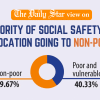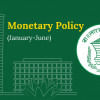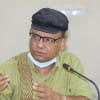What you need to know about inflation

Looking for a CNG, I found myself bargaining very hard. The usual fare from my house in Paltan to Farmgate was 200 taka. All of a sudden, no CNG driver was willing to go for less than 280.
Finally, a CNG driver with paan-stained teeth agreed to take me to my destination for 250 taka.
Due to the depleting foreign exchange reserves, the government has taken a series of measures, which include curbing luxury goods imports and fuel imports. This means that the supply for fuel in the market becomes inadequate to meet the demands of the population, and there is a scarcity. What this leads to is surge pricing, which means that the prices of the goods are increased to de-incentivise people from buying that product, in this case, fuel.
Another reason why the government may have increased the prices of fuels is to repay the loan from International Monetary Fund (IMF), to deal with the dwindling foreign exchange reserves. This means that the government has to comply with the austerity measures asked by the IMF to seek such a loan, which may explain the sudden price hike, too.
Note that the harmful impact of this fuel price hike can be felt across the entire socio-economic ladder. However, it disproportionately harms people from the lower socio-economic order even more, especially because the status quo is filled with income inequality.
This means that as fuel prices increase, the costs of the most basic necessities such as food and transport also increase. For example, food prices increase simply because the transport cost of the food from where it is produced to markets increase. This is true for other consumer products as well, particularly evident with globalisation, as most products tend to be produced further away from consumers. Therefore, an increase in transport costs directly impacts the market price of those products.
This also means that there is a very sharp fare hike for transports across the city. What this looks like is that school students have to pay 5 taka more for each bus trip.
The working class still receives the same wages as before, and as they already have very little money in the status quo, their purchasing power decreases and so they are less likely to be able to invest into living better.
This is known as inflation, which refers to the general increase in the price of goods and services in the economy. Inflation leads to the devaluation of a particular currency as the purchasing power of money decreases during periods of inflation. This is why you see the price of 1 US dollar increasing to 114 taka in the news.
With a 7.56 percent inflation rate already in place, such a fuel price hike means that such vulnerable people are going to suffer much more. Therefore, it is high time that we take off our privilege-tainted glasses and ask ourselves how such policies really affect the struggles of vulnerable people at the bottom of the socio-economic ladder.
Hrishik spends his evenings adjudicating debate spars, and writes poetry at 3AM. Send him matter banks about Economics at [email protected]

 For all latest news, follow The Daily Star's Google News channel.
For all latest news, follow The Daily Star's Google News channel. 









Comments